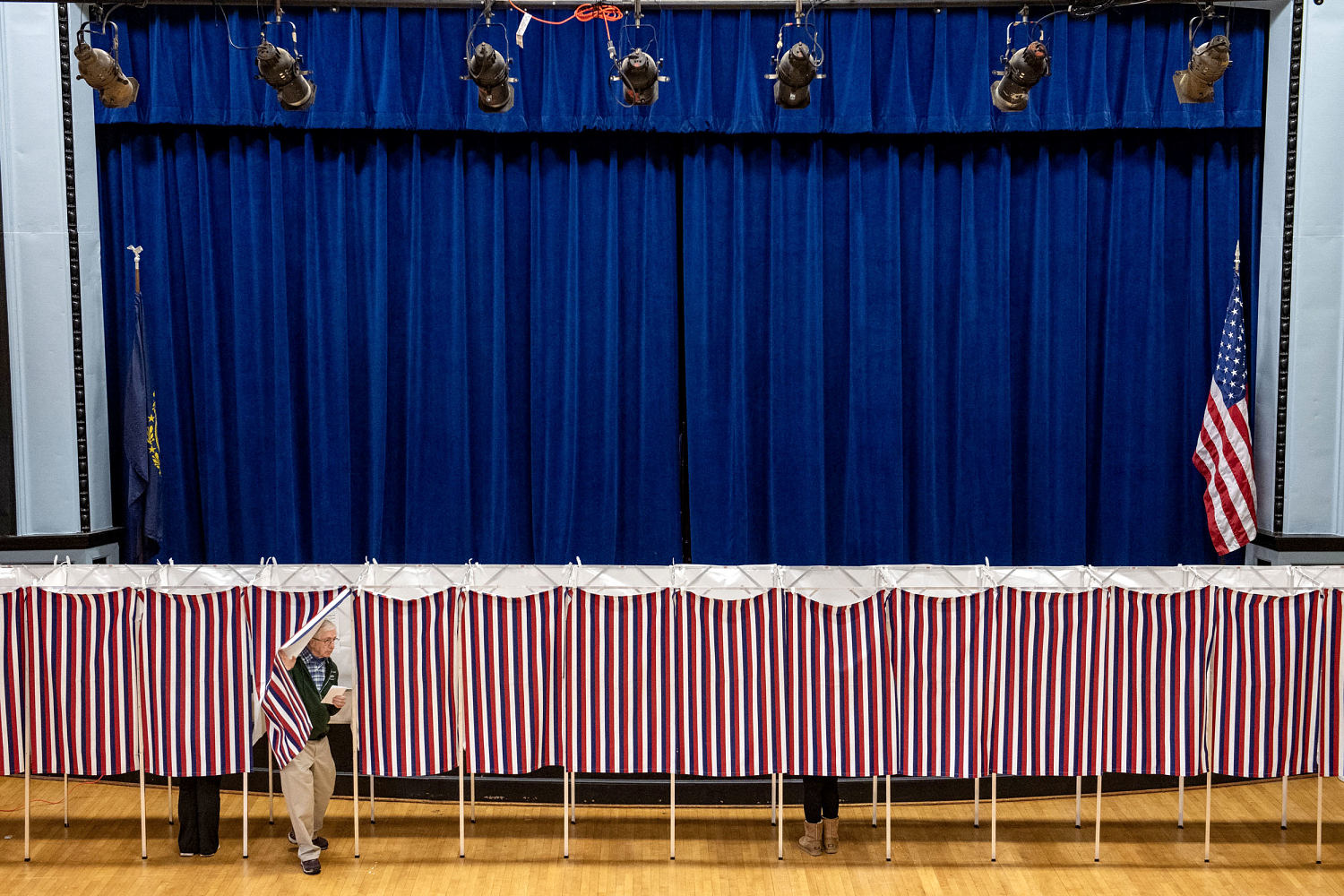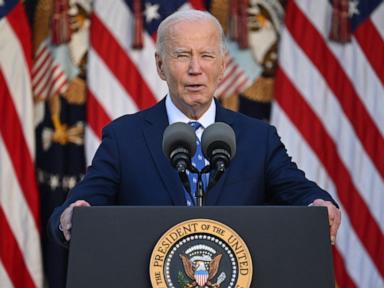5 key takeaways from Israel-Lebanon ceasefire brokered by US

President Biden’s announcement Tuesday of a ceasefire between Israel and Hezbollah in Lebanon marked a significant foreign policy achievement weeks before he leaves office.
The halt in fighting provides desperately needed calm for Israeli and Lebanese civilians along the border — and a chance to return to abandoned communities — after nearly 14 months of intensive rocket fire, airstrikes and an Israeli ground invasion into southern Lebanon.
While Hezbollah had suffered major losses under attacks from Israel, the truce also relieves pressure on Israel’s military, as the country’s largely reserve forces have been fighting on multiple fronts for more a year.
“Negotiations succeed when there's urgency, when both sides feel that cutting a deal makes more sense than obstructing one,” said Aaron David Miller, a veteran Middle East negotiator and senior fellow with the Carnegie Endowment for International Peace.
“And right now, the way I'd sum this up is that Israel wanted this deal and Hezbollah needed this deal.”
Here are five takeaways from the deal:
Terms of the deal
The terms of the deal build on a 2006 ceasefire between Israel and Lebanon that was enshrined in the United Nations Security Council — requiring no military presence in the territory between Israel and the Litani River in Lebanon.
Hezbollah ignored the terms of that deal, building up a military infrastructure of underground tunnels, weapons caches and concentration of fighters.
To prevent this from happening again, the Biden administration is focusing efforts on strengthening Lebanon’s Armed Forces to be the security guarantors in the region.
Over a period of 60 days, Israel’s army will withdraw from southern Lebanon while the Lebanese Armed Forces will begin deployments in the region. An oversight mechanism — composed of diplomats and military personnel, including France but chaired by the U.S. — is meant to validate any reported violations. The U.S. has also endorsed Israel’s right to self-defense if it detects an immediate threat from Hezbollah or any other hostile armed group in the region.
“Going forward, Israel probably will not hesitate to attack Hezbollah if it believes the group is working against the ceasefire agreement,” Nicholas Blanford, nonresident senior fellow with the Atlantic Council’s Middle East Programs, said in a statement.
“The question is whether Hezbollah would retaliate to such actions or absorb any blows inflicted by Israel in order not to revive a war that has proven costly for the organization.”
Southern Lebanon’s reconstruction
On top of personnel to monitor the implementation of the ceasefire agreement, the U.S. is helping coordinate financial support for the Lebanese Armed Forces, along with training and equipment to carry out its security role in southern Lebanon.
“There is another element here, which is something called the MTC, the Military Technical Committee, which has been revived by us [the U.S.] a few months ago, and that includes several other countries militaries, who will be providing additional support, equipment, training and financial support and financial resources to the Lebanese army and security services,” a senior administration official said.
The U.S., along with other partners, want the Lebanese army to fill the vacuum that Hezbollah had occupied, boosted by international reconstruction and economic support for communities in the south.
“Learning from the mistakes of the past, where Hezbollah was the only organization that was doing any work — did very little, but it was the only one that did some reconstruction in South Lebanon — I think it's in our interests, collectively as the international community, to support economic growth and to bring Lebanon back to health,” the official added.
Trump adviser takes credit
The Biden administration briefed President-elect Trump’s national security team on how the ceasefire deal was coming together, and Israeli Prime Minister Benjamin Netanyahu and his advisers have talked with Trump about the situation in the Middle East.
But the president-elect’s allies are spinning the deal’s conclusion as a result of Trump’s election victory.
“Everyone is coming to the table because of President Trump,” Rep. Mike Waltz (R-Fla.), the incoming national security adviser, posted on social platform X.
“His resounding victory sent a clear message to the rest of the world that chaos won’t be tolerated. I’m glad to see concrete steps towards de-escalation in the Middle East.”
Miller dismissed the notion that Trump swung the momentum of the deal, saying strain on Israel’s military pushed Netanyahu to finally come to an agreement.
“Israel has a small standing army. Most of the fighting is done by reservists. They are exhausted and they are stressed to the point where they're being asked to serve weeks and months longer than their even mandatory reserve duty,” he said.
“Number two, there's no doubt that Netanyahu’s priorities are Iran, and he wanted to stabilize the Lebanon threat so that he could focus on what to do with the actor that he considers to be the main threat and main challenge.”
What it means for Gaza
The U.S. is launching renewed diplomatic efforts to achieve a ceasefire between Israel and Hamas, one that would allow for the release of 101 hostages held in the Gaza Strip — including Americans — a halt in fighting, a surge of humanitarian relief for Palestinians, and likely the release of Palestinian prisoners in Israeli jails.
“I believe it is possible — and this Lebanon deal now can help break the logjam we are in,” Amos Hochstein, Biden’s special envoy who negotiated the Lebanon ceasefire, said Tuesday on MSNBC.
Israel has succeeded in weakening Hamas’s military forces and infrastructure enormously, marking a major psychological and tactical achievement with the killing of Hamas’s chief leader Yahya Sinwar last month.
But there are major hurdles to achieving a deal for Netanyahu, whose coalition relies on several far-right ministers.
“A Gaza deal presents grave difficulties for Netanyahu,” Miller said, pointing to Netanyahu’s coalition partners opposing the release of Palestinian prisoners, and that the prime minister is not likely to agree to Hamas’s demand of recognizing an end to the war.
“Neither of those things Netanyahu can agree to, it would break the coalition, plus the IDF [Israel Defense Forces] is preparing for a long stay because there is no governmental authority, there's no security architecture to replace the Israelis.”
Biden pushes for Israeli-Saudi deal
Biden, in his remarks on Tuesday, said he would use his final months in office to pursue the deal between Israel and Saudi Arabia, where Washington’s commitments to Riyadh include a security pact and help with a civil nuclear program.
Establishing ties between Israel and Saudi Arabia is viewed as the crown jewel of diplomatic efforts to reshape the Middle East, that would end isolation of Israel among Sunni-Muslim countries and deepen cooperation of a security group intent on pushing back against Iran.
The biggest obstacle to achieving a deal remains Israel’s refusal to recognize a pathway to a Palestinian state, an issue that has become even more difficult to achieve following Hamas’s Oct. 7 terrorist attack and Israel’s resulting war in the Gaza Strip.
Far-right members of Netanyahu’s coalition reject any notion of a Palestinian state, and Israeli public opinion is also broadly against the creation of a Palestinian state.
-

US attempts to broker ceasefire as civilians killed in Lebanon and Israel
World - The Guardian - October 31 -
FirstFT: US-brokered Lebanon ceasefire begins
World - Financial Times - 13 hours ago -

5 key takeaways from election night 2024
Top stories - NBC News - November 6 -

'Hamas has a choice to make,' Biden says, after Israel-Hezbollah ceasefire accepted
Top stories - ABC News - 9 hours ago -

Huge deal struck but is it enough? 5 takeaways from a dramatic COP29
Top stories - BBC News - 3 days ago -

US draws up draft Israel-Lebanon ceasefire plan
Business - Financial Times - October 31 -

US awaits Lebanon response to Hezbollah-Israel ceasefire plan
Top stories - BBC News - November 18 -

5 takeaways from the 2024 exit polls
Politics - The Hill - November 8
More from The Hill
-

Mel Gibson gives thanks for release of US man held by China
Politics - The Hill - 27 minutes ago -

US tells Ukraine to 'look hard' at lowering draft age in Russia war
Politics - The Hill - 1 hour ago -

Israel-Hezbollah ceasefire begins under international watch
Politics - The Hill - 1 hour ago -

Biden blocks new mining at major Western coal hub
Politics - The Hill - 1 hour ago -

Americans' opinion of Republican Party on the rise
Politics - The Hill - 1 hour ago